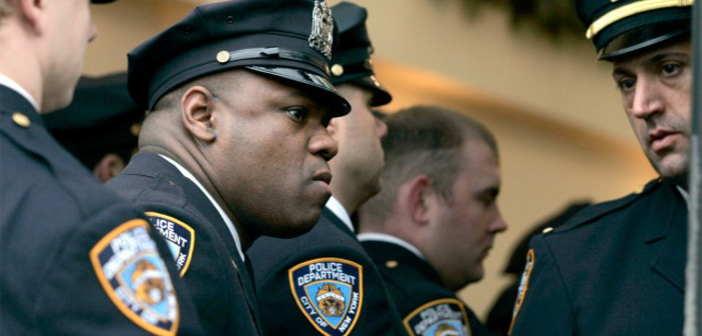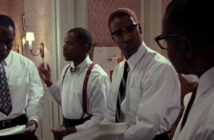Contrary to popular belief, black civilians in New York are not the only ones to have encountered racial profiling in the hands of the New York Police Department. Turns out, a number of Black NYPD officers say that while off-duty they have experienced the same horrendous racial profiling that took the life of unarmed 43-year-old Eric Garner, According to Reuters.
Reuters interviewed 25 African-American male officers, including 15 who were retired. All but one reported that when off duty and out of uniform, they had been victims of racial profiling and violence — a 96% rate in this case.
Some revealed they were pulled over for no reason; others had their heads slammed against their cars, guns brandished in their faces, were tossed into prison vans and experienced stop and frisks while shopping, Reuters reports. The majority of the officers said they had been pulled over multiple times while driving and five had guns drawn on them.
Desmond Blaize, who retired two years ago as a sergeant in the 41st Precinct in the Bronx, said he once got stopped while taking a jog through Brooklyn’s upmarket Prospect Park. “I had my ID on me so it didn’t escalate,” said Blaize, who has sued the department alleging he was racially harassed on the job. “But what’s suspicious about a jogger? In jogging clothes?”
The NYPD and the Patrolmen’s Benevolent Association, the police officers’ union, declined requests for comment. However, defenders of the NYPD credit its policing methods with transforming New York from the former murder capital of the world into the safest big city in the United States.
Not everyone in the Black community agrees that African Americans are unfairly targeted by police, including Bernard Parks, the former chief of the Los Angeles Police Department, who is African American, the report says.
“It makes good headlines to say this is occurring, but I don’t think you can validate it until you look into the circumstances they were stopped in,” he tells Reuters.
Blacks made up 73 percent of the shooting perpetrators in New York in 2011 and were 23 percent of the population.
A number of academics believe those statistics are potentially skewed because police over-focus on Black communities, while ignoring crime in other areas. They also note that being stopped as a suspect does not automatically equate to criminality. Nearly 90 percent of Blacks stopped by the NYPD, for example, are found not to be engaged in any crime.
The Black officers interviewed said they had been racially profiled by White officers exclusively, and about one third said they made some form of complaint to a supervisor.
“There’s no real outlet to report the abuse,” Brooklyn Borough President Eric Adams, a former NYPD captain who said he was stigmatized and retaliated against throughout his 22-year career for speaking out against racial profiling and police brutality, he tells Reuters.
All but one [of the black officers]said their supervisors either dismissed the complaints or retaliated against them by denying them overtime, choice assignments, or promotions. The remaining officers who made no complaints said they refrained from doing so either because they feared retribution or because they saw racial profiling as part of the system.
The news comes to light amid widespread protests in cities across the country over police profiling and excessive force in the Black community, which resulted in high-profile deaths this summer. Garner died in July after a White officer, Daniel Pantaleo, put him in a chokehold during an arrest for the alleged illegal sale of loose, untaxed cigarettes. The death, and that of unarmed Black teenager Michael Brown, 18, in Ferguson, Mo., turned the spotlight on police tactics in the Black community.
Fear of Reporting Abuse
People who have taken part in the marches against Garner’s death – and that of Ferguson teenager Michael Brown – say they are protesting against the indignity of being stopped by police for little or no reason as much as for the deaths themselves.
“There’s no real outlet to report the abuse,” said Brooklyn Borough President Eric Adams, a former NYPD captain who said he was stigmatized and retaliated against throughout his 22-year career for speaking out against racial profiling and police brutality.
Officers make complaints to the NYPD’s investigative arm, the Internal Affairs Bureau, only to later have their identities leaked, said Adams.
One of the better-known cases of alleged racial profiling of a black policeman concerns Harold Thomas, a decorated detective who retired this year after 30 years of service, including in New York’s elite Joint Terrorism Task Force.
Shortly before 1 a.m. one night in August 2012, Thomas was leaving a birthday party at a trendy New York nightclub.
Wearing flashy jewelry, green sweatpants and a white t-shirt, Thomas walked toward his brand-new white Escalade when two white police officers approached him. What happened next is in dispute, but an altercation ensued, culminating in Thomas getting his head smashed against the hood of his car and then spun to the ground and put in handcuffs.
“If I was white, it wouldn’t have happened,” said Thomas, who has filed a lawsuit against the city over the incident. The New York City Corporation Counsel said it could not comment on pending litigation.
At an ale house in Williamsburg, Brooklyn last week, a group of black police officers from across the city gathered for the beer and chicken wing special. They discussed how the officers involved in the Garner incident could have tried harder to talk down an upset Garner, or sprayed mace in his face, or forced him to the ground without using a chokehold. They all agreed his death was avoidable.
Said one officer from the 106th Precinct in Queens, “That could have been any one of us.”




